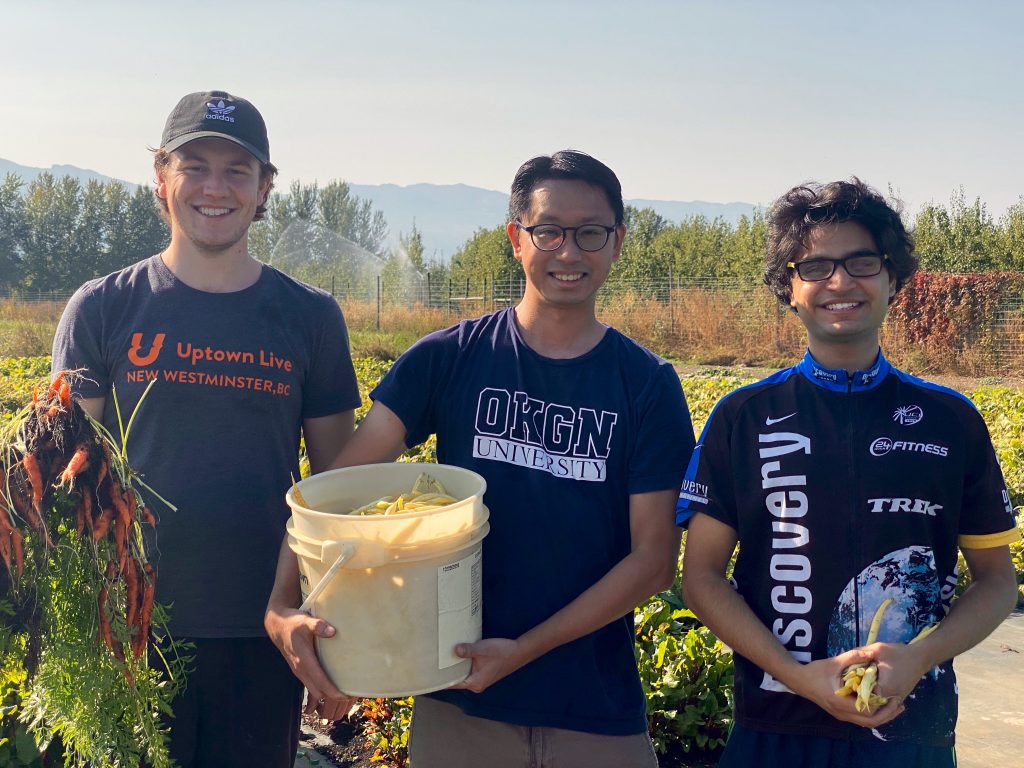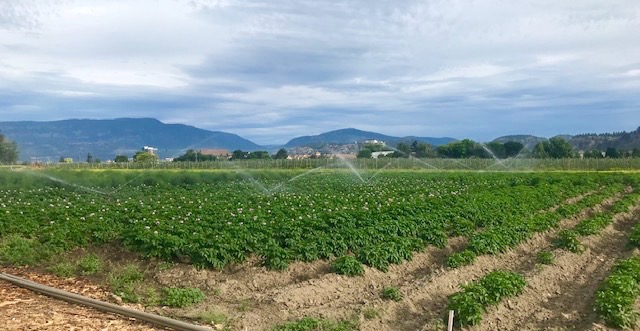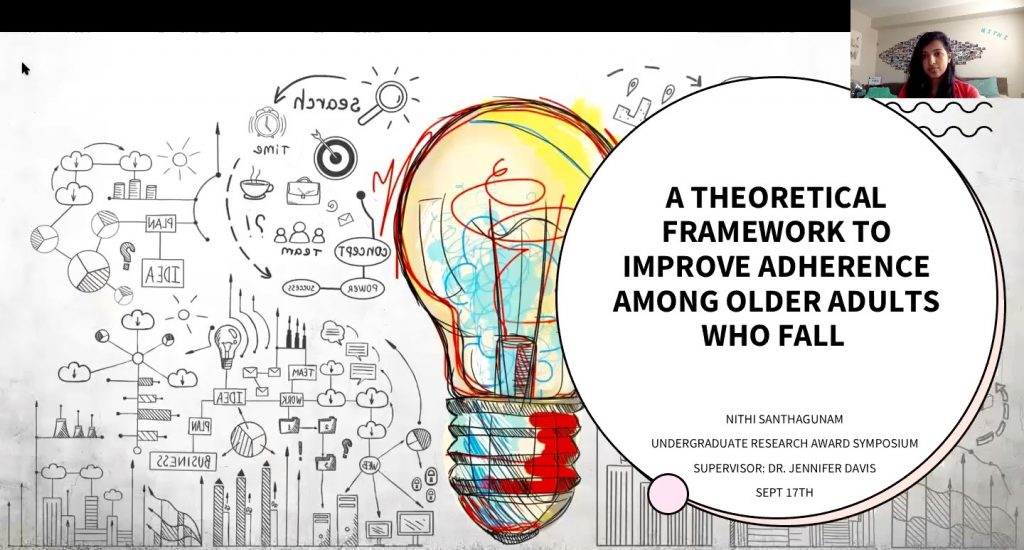Undergraduate research awards support students in making a difference.

How do you plan, track, and distribute hundreds of thousands of pounds of donated fresh produce throughout the Okanagan each year? That’s the problem faced by Kelowna-based Helen’s Acres. The community farm donates up to 200,000 pounds of fresh vegetables, berries and eggs every year to The Central Okanagan Community Food Bank and other social agencies.
Now, thanks in part to the work of Faculty of Management undergraduate students, that challenge is being addressed head-on. This month, Helen’s Acres will begin pilot testing a new inventory management system developed by a team led by associate professor Eric Li—a team that includes three of the seven recipients of this year’s Faculty of Management undergraduate research awards, which support experiential learning through the summer.
“The Central Okanagan Community Food Bank gets anywhere between $5 million and $7 million worth of produce every single year,” says fourth-year undergraduate student Shiven Vinod Khera, who worked with Li over the summer months to help refine the inventory system. “We devised a smart system that will let food banks know exactly where the produce is, what produce needs to go out, and when it’s going to expire. It also allows suppliers of the food bank to enter data directly as well.”

Vinod Khera’s contribution is just one example of the impactful research undertaken over the summer by the recipients of this year’s awards, which support undergraduate students in gaining exceptional learning experiences by working alongside faculty supervisors. This year’s awards include four Management Undergraduate Research Awards (MURA), two International Undergraduate Research Awards (IURA) and a Regional Socio-Economic Development Institute of Canada (RSEDIC) award.
Exceptional learning
“One of the unique things about this program is that the students are well funded throughout the summer,” notes UBCO assistant professor of management David Walker. “If you think about the prototypical university, students are looking for employment between May and September, and this is an opportunity for that employment to be research. It’s an opportunity to work on things that an undergraduate student wouldn’t typically work on.”
This year was no exception, despite the challenges presented by the COVID-19 pandemic. Over the summer months, Walker supervised (via Zoom calls and emails) Gabriel Tan, a third-year management undergraduate who is also pursuing a minor in computer science. Tan’s research looked at whether the audio characteristics of customer voices in service interactions predict that the customer will mistreat the employee later in the interaction.
“I’ve had this audio data for a while, and I needed someone with the skills to be able to take that audio and turn it into some numeric data that we can analyze,” says Walker. “Gabriel was able to take this data set containing over 300 audio clips, and start converting it into numeric files.”
While Tan and Walker aren’t yet able to draw any definitive conclusions from their investigations so far, the work will continue—Tan is now working as Walker’s research assistant.
“When I first started out on this project, it was very intimidating,” admits Tan. “It was very challenging because I didn’t really know much about the subject matter. But as it went on, I got better at reading the literature, and the pieces kind of just stuck together.
“I feel like this changed my perspective—and now I feel that maybe there is potential for me to excel in research if I really put in the effort.”
Career development
Tan isn’t the only award recipient to have been given additional opportunities to continue engaging in research with their supervisor. Fourth-year undergraduate (Shree) Nithi Santhagunam and fifth-year undergraduate Vinil Sood will both continue working as research assistants with their faculty supervisors.
Santhagunam is now a research assistant to assistant professor Jennifer Davis, with whom she conducted a comprehensive review on promoting adherence to recommendations for fall prevention provided by a Falls Prevention Clinic for seniors. She also assisted in designing a survey to assess the health and economic impacts of COVID-19 on tenure-track faculty across Canada. And Sood, who researched food waste in the global food chain, has been a research assistant to Li since 2018.

“There are several things that undergraduate students bring to the table,” Davis observes. “One is a new energy to projects, and with that new energy comes new ideas. Many undergraduate students are completing minors in areas outside of management. For example, Nithi is doing a minor in psychology. She was able to bring a psychology perspective to interpreting the review, and for developing a theoretical framework that provides model for how to promote adherence among those at high risk of falls.”
Santhagunam’s work has also earned her a first author credit on a paper to be submitted soon to a peer-reviewed journal. “I had never even dreamt about writing a paper that might get published someday,” she says. “I never thought of myself as a research person. Now I understand what research is, and all the things that you can do—from writing papers, to literature reviews, to testing ideas. I think what I’ve learned over the summer has really opened me up to new avenues for my future.”
While it may seem unusual to have an undergraduate’s name on a peer-reviewed paper, that’s precisely the kind of opportunities that often arise from these awards and the connections they help to foster. Ying Zhu, assistant professor in the Faculty of Management notes that, this year, she published a paper whose second author is her undergraduate research assistant.
The students Zhu supervised over the summer—Beyond Zhao, a second-year undergraduate, and third-year undergraduate Patrick Feng—she says, “put a lot of time at first to improve, and now they are junior scholars. I’m going to keep working with them for sure in the coming years.”
Opening new avenues
Zhao’s work focused on examining how consumers responded to online ads for bulk buys compared to single purchases of items, while Feng examined responses to ads for services compared to tangible goods on touchscreens and PCs. “Before this summer, I was focused on planning a career in industry,” says Feng. “Now, I’m much more excited about research, and I hope to take part in more projects, and continue developing my research skills.”
 Zhao, who at 19 is the youngest research student Zhu has ever supervised, is similarly enthusiastic about her experience. “It was such an amazing opportunity,” she says. “It was almost like getting paid to learn, and who doesn’t want that? I learned so many things. It feels like I’ve done a whole extra year of university.”
Zhao, who at 19 is the youngest research student Zhu has ever supervised, is similarly enthusiastic about her experience. “It was such an amazing opportunity,” she says. “It was almost like getting paid to learn, and who doesn’t want that? I learned so many things. It feels like I’ve done a whole extra year of university.”
That sentiment is echoed by Mohana Rambe, a third-year undergraduate student who conducted a systematic review of food-bank operations as part of Eric Li’s team—work that helped inform the design of the new inventory system for Helen’s Acres.
“It was kind of like getting trained for third year,” she says. “One of my core courses in third year is in operations management, and when I read my coursework, everything’s easy, and I’m thinking about how it could be applied in different situations.”
A part of something greater
What’s clear is that these students have done more than acquire new skills and knowledge—they also broadened their perspectives and opened up new ideas and options for the future. And during a time when the world is struggling to contain a global pandemic, these students were able to make real, significant contributions to the social good, in the local region and beyond.
“At the end of the day, I feel like I’m getting more than what I’m giving back,” says Rambe. It’s a sentiment echoed by Sood, who adds: “It feels great to be part of a project that is going to be part of the change we need.” For Li, this is precisely what post-secondary university is all about:
“As university educators, we are training the next generation. One day they will be someone’s teacher, whether in a university setting or as a mentor. We are training them to carry on this legacy.”
Sidebar:
The recipients of the 2020 Management Undergraduate Research Awards, funded by UBCO’s Faculty of Management, are (Shree) Nithi Santhagunam, Vinil Sood, Shiven Vinod Khera and Beyond Zhao.
The recipients of the 2020 International Undergraduate Research Awards, funded by UBCO’s International Student Initiative office, are Patrick Feng and Gabriel Tan.
The recipient of the 2020 Regional Socio-Economic Development Institute of Canada award, funded by the institute, is Mohana Rambe.
Story written by Jess Werb.